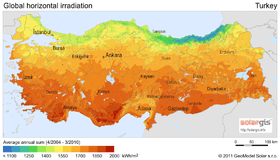Solar power in Turkey
Turkey is located in an advantageous position in the Middle East and Southeast Europe for solar energy. Compared to the rest of the region, insolation values are higher and conditions for solar power generation are comparable to Spain. Previously, the government was aiming for at least 3 gigawatts (GW) by 2023.[1]. However, 3,420 MW were already registered by the end of 2017 [2], although the actual cumulative installations for the year end has been estimated as 2647 MW. Solar power in Turkey could increase massively if proper policies were adopted, but growth has only picked up in recent years. Although solar panel prices are decreasing, the generation cost of solar power is high as compared to other power generation methods. Solar potential is very high in Turkey, especially in South Eastern Anatolia and Mediterranean regions.[3]
Insolation
- The annual average total insolation duration is 2640 hours (7.2 hours per day).
- Average annual solar radiation is 1311 kW·h/(m²·yr) or 3.6 kW·h/(m²·d).
Covering one half of one percent of the land area of Turkey with solar panels would be sufficient to generate all of the electricity used.
Policies, laws and incentives
Turkey enacted its second Renewable Energy Law, namely Law No. 6094 Concerning the use of Renewable Energy Resources for the Generation of Electrical Energy, in 2010.[4] Turkish government is also encouraging expansion and the utilization of solar energy for electricity generation. To stimulate investment in renewables, various incentive schemes have been introduced For example, renewable energy plants with an installed capacity of 500 kW or less are exempt from licensing obligations [3] Solar energy sources are covered by this law, which decrees that facilities which generate electricity from renewable energy sources will be granted a renewable energy resources certificate (RER Certificate) which will entitle such facilities to benefit from the incentives provided by the Law. EMRA is the competent authority to grant the RER Certificates.
Systems producing up to 50KW (e.g. residential systems) are more lightly regulated than larger ones.[5]
Systems producing up to 1-megawatt (MW) of energy do not need a license, and plugged into the national grid are eligible for payments of US$0.133 per kilowatt-hour for 10 years.[6]
Systems producing over 1-megawatt (MW) of energy must be licensed, but only if they feed into the grid. Such licences often become mired in the bureaucracy which is meant to ensure the grid can cope.[7] As of May 2015 600MW of these larger installation tenders have been approved. The one off fee per MW varies considerably depending on the result of each tender.
Turkey has a fair feed in tariff.[8] Turkey is already at grid parity for private households and commercial users. In the coming years solar energy will be feasible without any feed-in-tariff mechanism.[9]
Heating and hot water
The main solar energy utilizations in Turkey are the flat-plate collectors in domestic hot water systems. Turkey is one of the leading countries in the world with a total installed capacity of 10 GWth as of 2011 (129 kWth /1,000 inhabitants)[10]
The industry is well developed with high quality manufacturing and export capacity. The number of companies is around 100 and annual manufacturing capacity is 750,000 m². .
Photovoltaics
Photovoltaics (PV) are expected to grow dramatically in the next few years.[11] Chinese companies are investing.[12] Solar power plants are manufactured in Turkey and also a prototype dye-sensitized solar cell production plant is to be set up.[13] In 2015, PV produced nearly 700 TeraJoule.[14]
| Year | Added PV capacity |
Total (MWp) |
Generated (GWh) |
|---|---|---|---|
| 2008 | 0.75 | 4 | n.a. |
| 2009 | 1 | 5 | n.a. |
| 2010 | 1 | 6 | n.a. |
| 2011 | 1 | 7 | n.a. |
| 2012 | 5 | 12 | n.a. |
| 2013 | 6 | 18 | n.a. |
| 2014 | 40 | 58 | n.a. |
| 2015 | 191 | 249 | n.a. |
| 2016 | 583 | 832 | n.a. |
| 2017 | 1790 | 2647 | n.a. |
| IEA-PVPS,[15] previous[16][17][18][19][20] | |||
Concentrated Solar Power
The Greenway CSP Mersin Solar Tower Plant has an installed power of 5 MW constructed at Mersin by Greenway CSP.[21]
See also
References
- ↑ "Using Solar Energy Sources To Generate Electricity In Turkey".
- ↑ "TÜRKİYE ELEKTRİK SİSTEMİ KURULUŞ ve KAYNAKLARA GÖRE KURULU GÜÇ" (PDF). Retrieved 5 February 2018.
- 1 2 DAWOOD, KAMRAN (2016). "Hybrid wind-solar reliable solution for Turkey to meet electric demand". Balkan Journal of Electrical and Computer Engineering. 4 (2): 62–66. doi:10.17694/bajece.06954.2016.09.01.
- ↑ Renewable Energy Law
- ↑ "Archived copy". Archived from the original on 2015-09-25. Retrieved 2015-09-23.
- ↑ http://www.solarnovus.com/policy-in-turkey-encourages-renewable-energy-generation_N7146.html
- ↑ http://www.apricum-group.com/wp-content/uploads/2014/09/pv-magazine-September-2014_Turkish-solar-market.pdf
- ↑ "Turkey Photovoltaic (Solar PV) Market: Outlook 2014 - 2025".
- ↑ http://www.renewableenergyworld.com/rea/news/article/2013/10/why-should-investors-choose-the-turkish-solar-market
- ↑ "SOLAR HEAT WORLDWIDE 2011" (PDF).
- ↑ "Solar Power Surges On Turkish Policy Backing".
- ↑ "CHINESE INVEST IN TURKISH SOLAR ENERGY". Sabah.
- ↑ "Dye Solar Cell Manufacturer Dyesol To Develop Prototype Manufacturing Facility In Turkey".
- ↑ "Supply, transformation and consumption of renewable energies - annual data (choose Solar and TeraJoule)". EuroStat. 2017-02-06. Retrieved 2017-02-28.
- ↑ "Snapshot of Global PV 1992-2014" (PDF). http://www.iea-pvps.org/index.php?id=32. International Energy Agency — Photovoltaic Power Systems Programme. 30 March 2015. p. 15. Archived from the original on 30 March 2015. External link in
|website=(help) - ↑ Trends Report 2010
- ↑ Trends Report 2008
- ↑ Trends Report 2009
- ↑ Global Market Outlook for Photovoltaics 2013-2017 Archived 2014-11-06 at WebCite
- ↑ "Global Market Outlook for Photovoltaics 2014-2018" (PDF). www.epia.org. EPIA - European Photovoltaic Industry Association. p. 24. Archived from the original (PDF) on 12 June 2014. Retrieved 12 June 2014.
- ↑ "Solar tower at Mersin". Hurriet.
External links
| Wikimedia Commons has media related to Solar energy in Turkey. |
